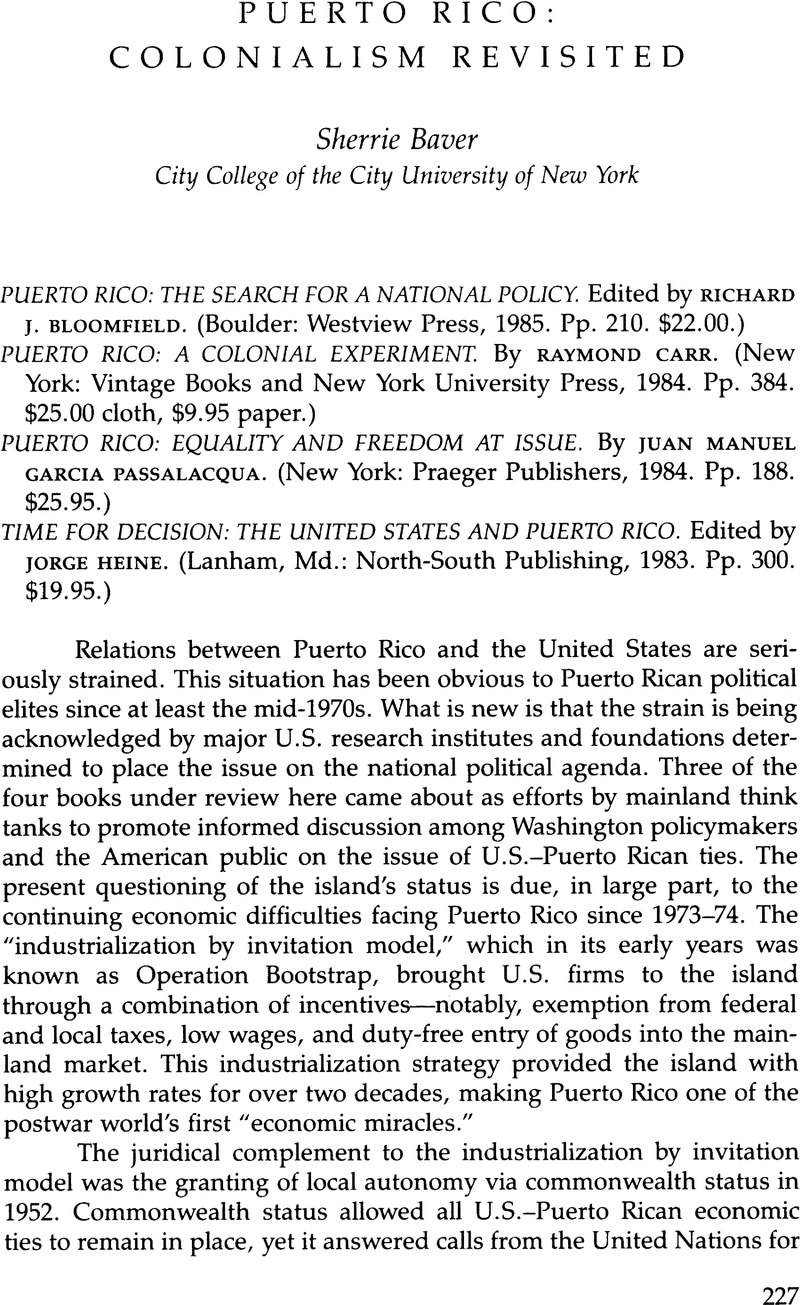No CrossRef data available.
Published online by Cambridge University Press: 12 October 2022

1. See, for example, Frank Bonilla and Ricardo Campos, “A Wealth of Poor: Puerto Ricans in the New Economic Order,” Daedalus 60 (Spring 1981):133–76.
2. U.S. Department of Commerce Economic Study of Puerto Rico 1 (Washington, D.C.: U.S. Government Printing Office, 1979), 13–18.
3. See José A. Cabranes, “Puerto Rico: Out of the Colonial Closet,” Foreign Policy 33 (Winter 1978–79):66–91.
4. Apparently, this point was made to President Carter by the Commerce Department after its 1979 study. García Passalacqua provides documentation in Equality and Freedom, 160–61.
5. Angelo Falcón, “An Attack on Puerto Rican Society,” San Juan Star, 16 Sept. 1984. The Lewis study to which Falcón refers is La Vida: A Puerto Rican Family in the Culture of Poverty, San Juan and New York (New York: Random House, 1966).
6. On federal harrassment of Independentistas, see Carmen Gautier Mayoral and Teresa Blanco Stahl, “COINTELPRO e Puerto Rico, 1960–1971,” Pensamento Crítico (Summer 1979); the article was also reprinted in the San Juan Star, 29 Jan. 1980.
7. Several progressive analysts of Puerto Rico have challenged the use of a dependency framework in the case of Puerto Rico. The History Task Force of the Centro de Estudios Puertorriqueños suggests that commonwealth status “fused” Puerto Rico's economy with the United States so that the island economy could no longer be described in terms of “a foreign presence, penetration, control, or dependence.” This point is made in Labor Migration under Capitalism, by the History Task Force (New York: Monthly Review Press, 1979), 129. A second typical critique of a dependency approach to Puerto Rico is offered by Emilio Pantojas García, who argues that Villamil's focus on dependency ignores the more important issue of class relations. See “Reflexiones críticas en torno al uso del concepto de dependencia como categoría explicativa en el análisis del proceso de desarrollo en Puerto Rico,” Hómines (Río Piedras) 6 (July 1982—Jan. 1983):1–14.
8. Randolph Mye, Deputy Staff Director for the U.S. Commerce Department's 1979 report on Puerto Rico (the Kreps Report), suggested that island politicians call a moratorium on the status debate until Puerto Rico regains its economic health. See his chapter in Bloomfield, Puerto Rico: The Search for a National Policy, 85–93.
9. On Puerto Rico's status as a matter of national interest, see Alfred Stepan, “The U.S. and Latin America: Vital Interests and Instruments of Power,” Foreign Affairs 58, no. 3 (1980). The section of the article on Puerto Rico is reprinted in Heine, Time for Decision, 267–74.